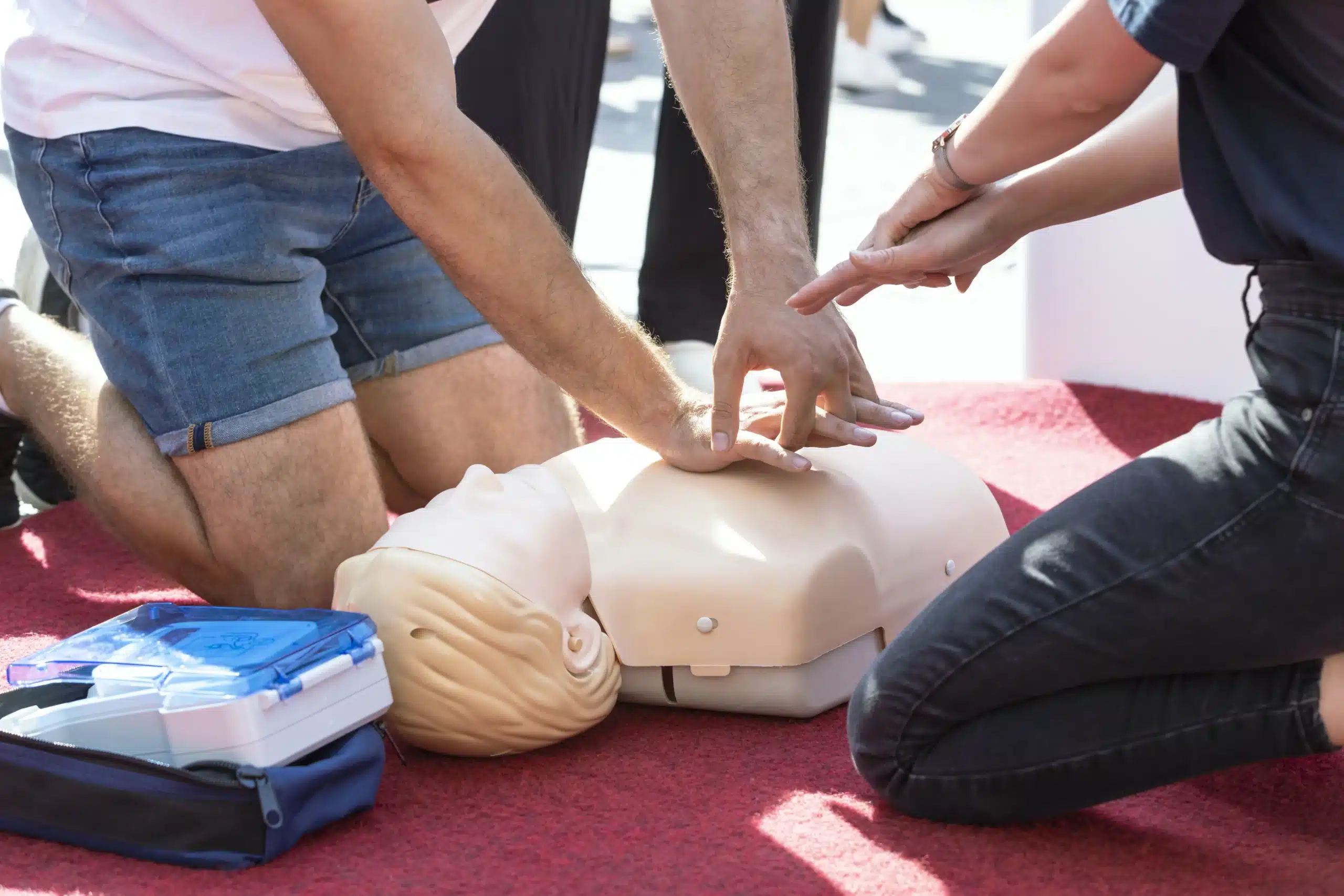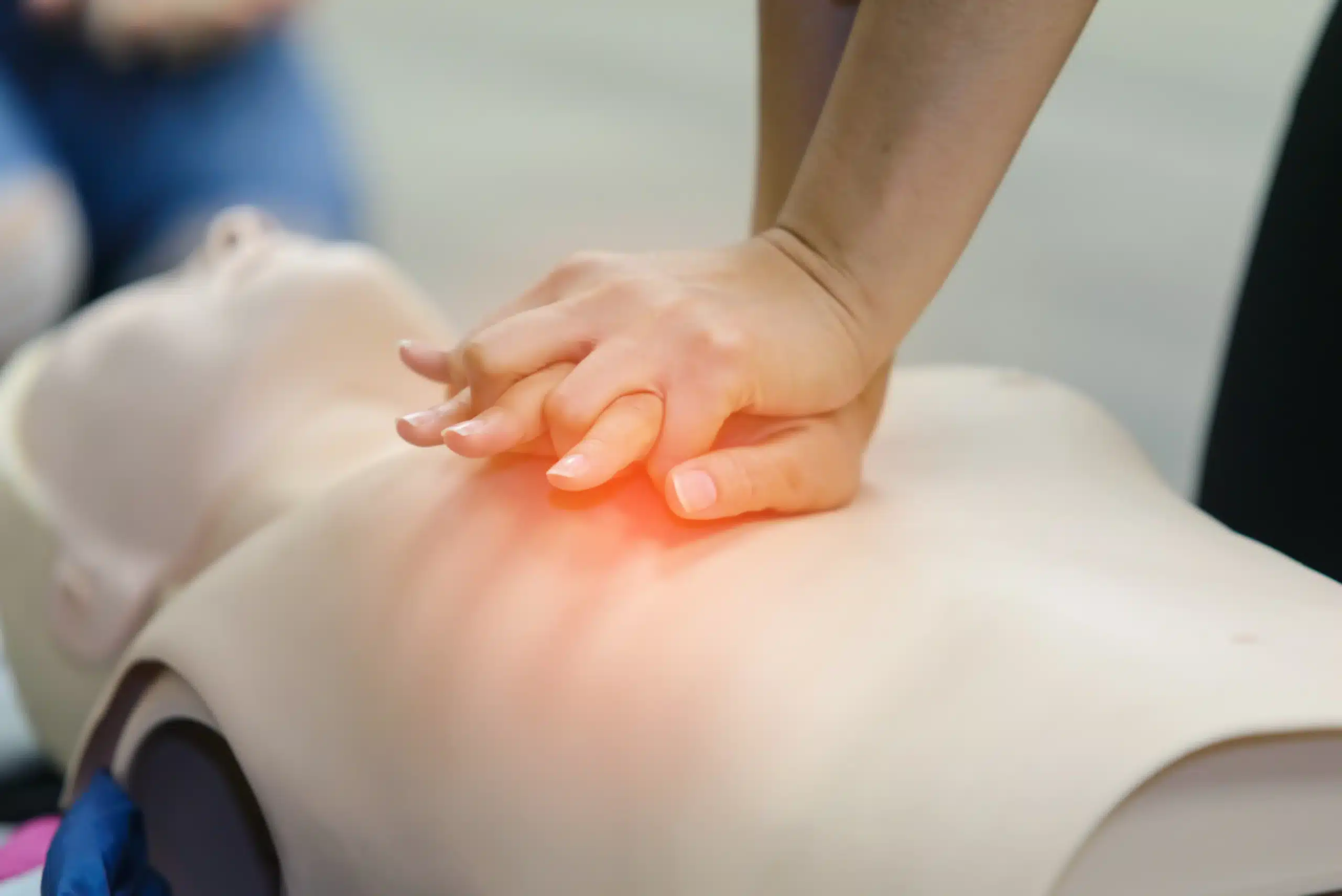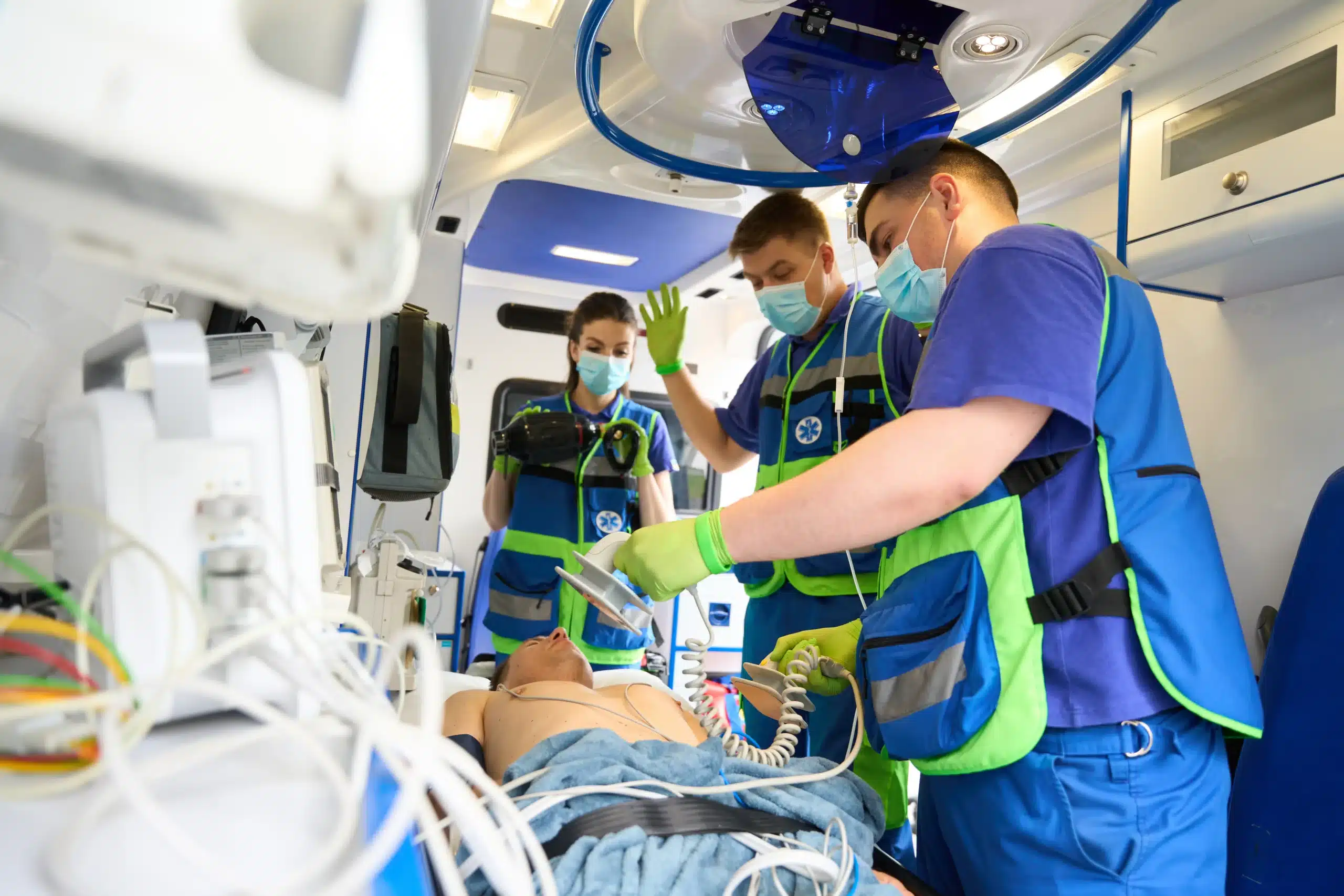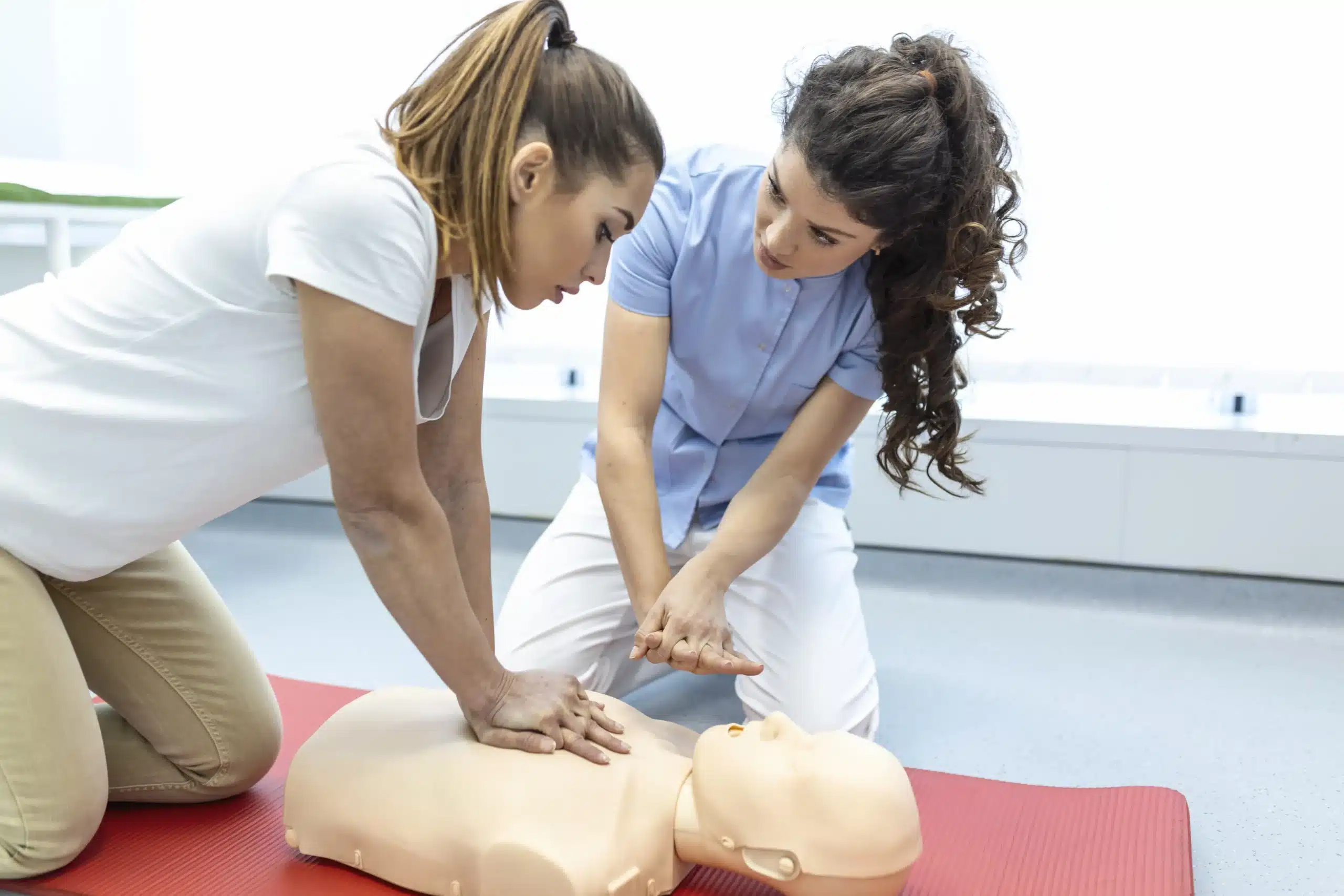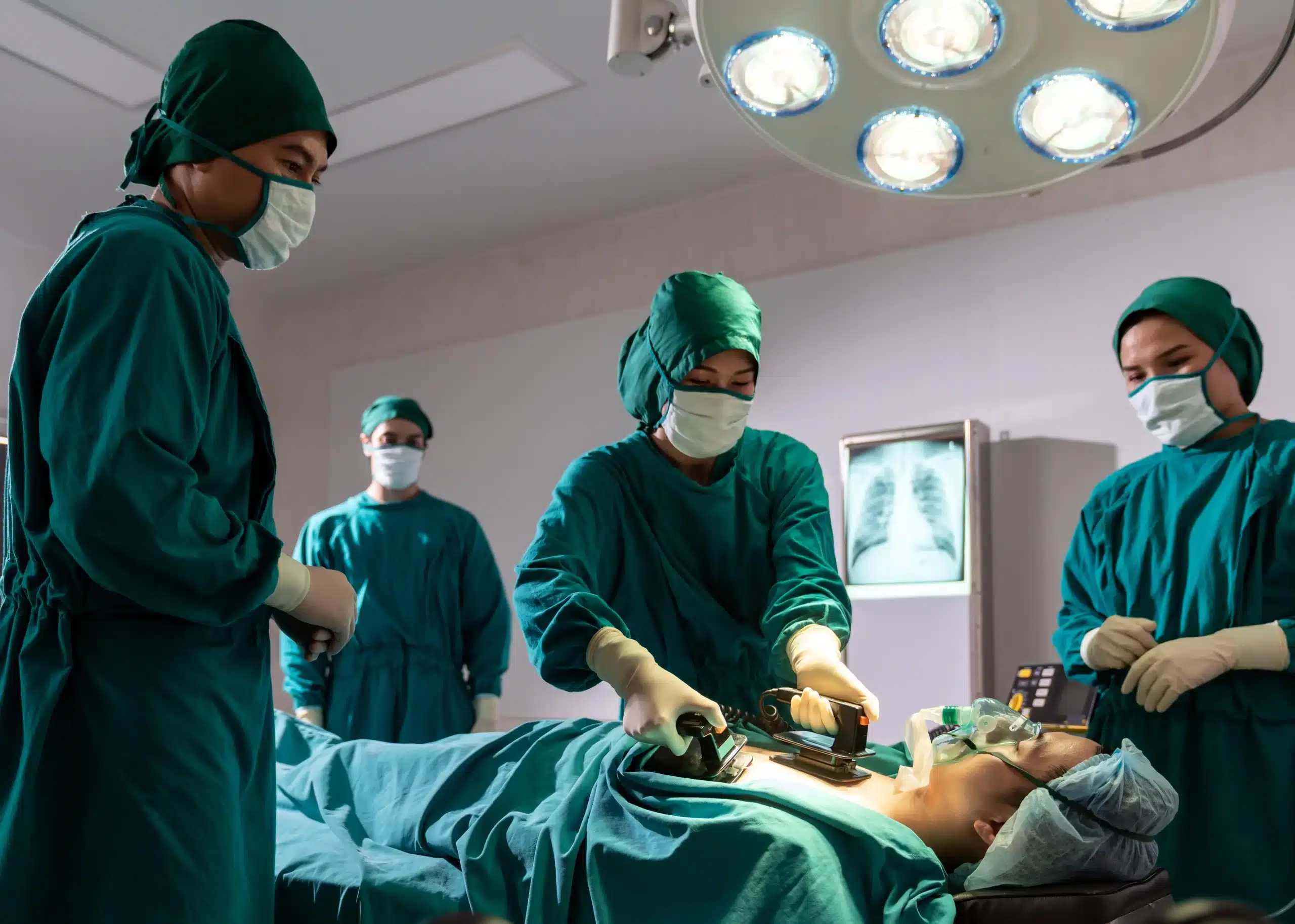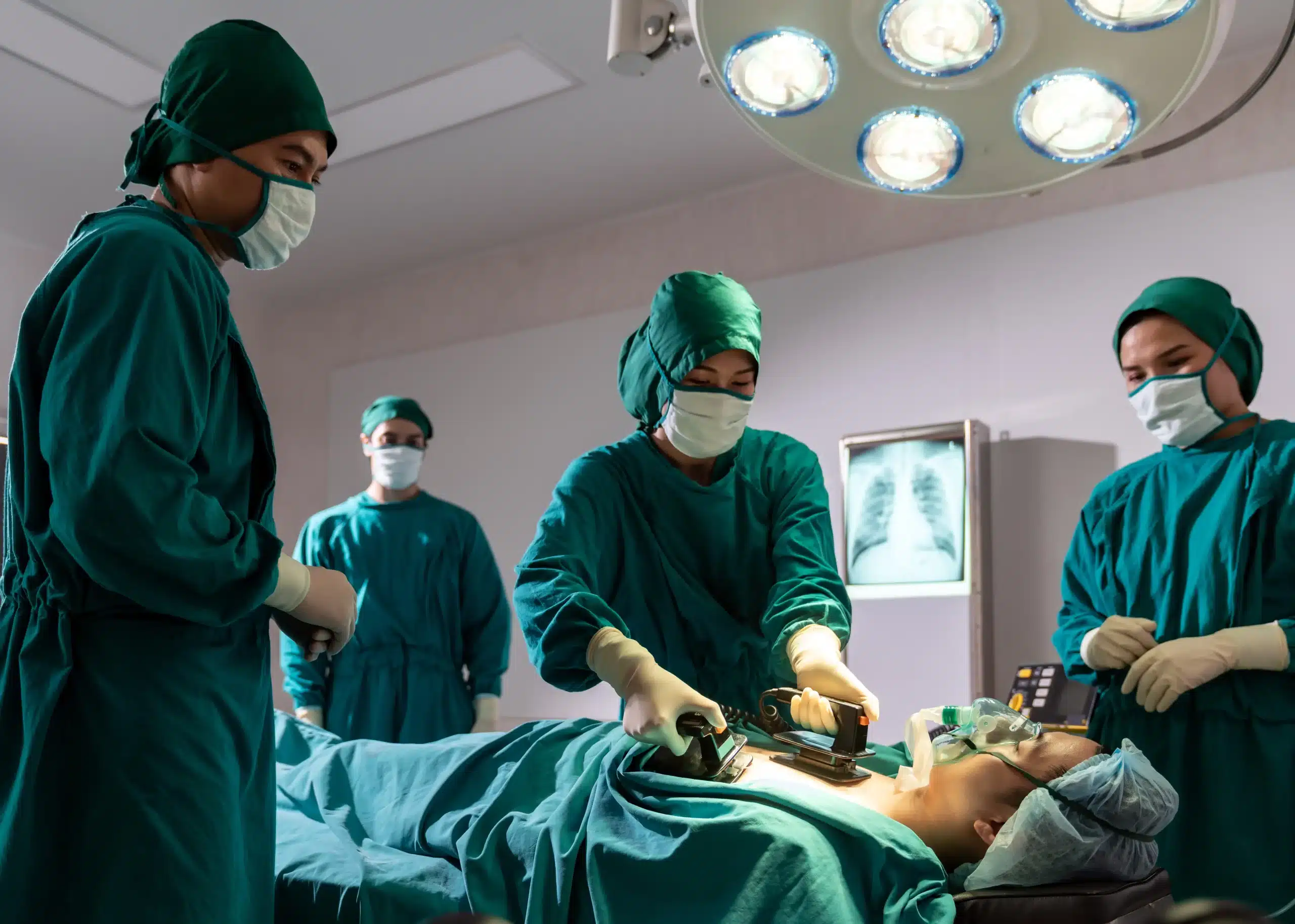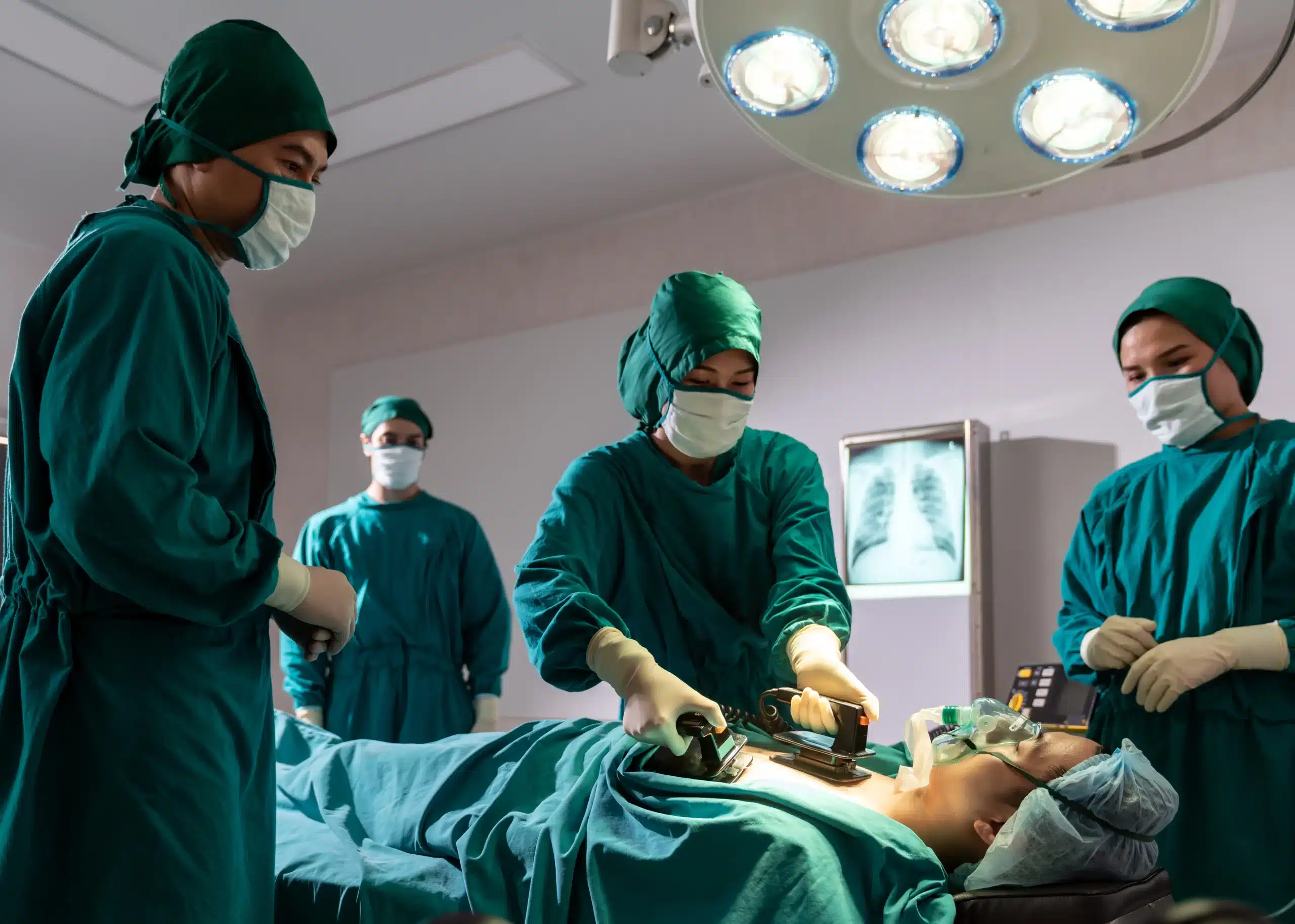Life is unpredictable. Emergencies can happen anytime, anywhere. Wouldn’t you feel more confident knowing you could provide immediate assistance to a loved one or even a stranger in need? This comprehensive guide is your go-to resource for CPR and first-aid training in Corte Madera. We’ll cover various training options, certification paths, associated costs, and the importance of training locally. Whether you’re a healthcare professional, a childcare provider, or simply someone who wants to be prepared, learning CPR and first-aid in Corte Madera is an investment in yourself and your community.
Key Takeaways
- Find the right CPR and first aid training for you: Explore options ranging from basic CPR to advanced certifications like ACLS and PALS. Choose a format—online, in-person, or hybrid—that suits your learning style and schedule. Providers in Corte Madera offer flexible options to fit your needs.
- Consider key factors when selecting a course: Think about cost, instructor experience, and the specific topics covered. Look for courses aligned with current American Heart Association guidelines. Corte Madera offers various providers, so compare what each offers to find the best match.
- Build a prepared community: Talk to your friends, family, and neighbors about getting certified. A network of trained individuals strengthens community resilience during emergencies. Support local training businesses and stay current with the latest guidelines to maintain your skills.
What is CPR and First Aid?
CPR, or cardiopulmonary resuscitation, is a life-saving technique used when someone is unconscious and not breathing or only gasping. These are signs of cardiac arrest, and CPR helps restore blood circulation and breathing through chest compressions and rescue breaths. First aid covers a broader range of immediate care for various injuries and illnesses, from cuts and burns to fractures and allergic reactions. You provide this care until professional medics arrive. While CPR is a critical element of first aid, first aid encompasses many other skills to help stabilize someone needing urgent care. Both CPR and first aid training are readily available, often following American Heart Association guidelines. Certifications are typically valid for two years, ensuring your skills and knowledge are up-to-date for effective emergency response.
Find CPR and First Aid Training in Corte Madera
Finding the right CPR and first aid training in Corte Madera depends on your learning style and schedule. Luckily, several options are available, from traditional in-person classes to online courses and convenient hybrid programs. Let’s explore the different training formats.
In-Person Classes
In-person CPR classes offer a hands-on learning experience guided by certified instructors. This format allows for real-time feedback, practice scenarios, and the opportunity to ask questions and interact with fellow students. Providers like Safety Training Seminars offer American Heart Association courses throughout Northern California, ensuring you receive high-quality, accredited training. This traditional approach is ideal for those who thrive in a structured classroom setting.
Online Courses
If your schedule is tight or you prefer learning at your own pace, online CPR and first aid courses offer a flexible alternative. CPR Test Center provides online certification accredited by the eCPRVerify National Registry. These courses cover essential techniques aligned with organizations like the American Red Cross and American Heart Association. Online learning lets you study anytime, anywhere, making it convenient for busy individuals.
Hybrid Learning Programs
Combining the best of both worlds, hybrid learning programs offer a blend of online coursework and in-person skills sessions. Safety Training Seminars’ RQI (Resuscitation Quality Improvement) program is a great example. You’ll complete the cognitive portion online, then attend a shorter in-person session to practice your skills and receive your certification. This format offers flexibility while still providing essential hands-on training.
In-Home Training
For ultimate convenience, consider in-home CPR and first aid training. Companies like In-Home CPR bring the training directly to your home or workplace in Corte Madera. This personalized approach is perfect for groups, families, or businesses looking to train multiple individuals at once. With no minimum number of students required, in-home training offers a flexible and comfortable learning environment.
Get Certified in Corte Madera
Getting certified in CPR, first aid, and other life-saving skills is easy and convenient in Corte Madera. Whether you’re a healthcare professional, childcare provider, or simply want to be prepared for emergencies, several certification courses are available to suit your needs. Let’s explore the key certifications you can obtain in Corte Madera:
CPR Certification
CPR certification gives you the skills to respond effectively to cardiac emergencies. You’ll learn how to perform chest compressions, rescue breaths, and use an automated external defibrillator (AED). These skills can be crucial in helping someone survive cardiac arrest. In-Home CPR offers convenient CPR training in Corte Madera, bringing the class to your home or workplace.
First Aid Certification
First aid certification expands beyond CPR, covering a wider range of emergency situations. You’ll learn how to manage injuries like bleeding, burns, and fractures, and how to respond to medical emergencies such as strokes and heart attacks. First aid training often includes CPR and AED instruction, providing comprehensive skills for various emergencies.
BLS Certification
Basic Life Support (BLS) certification is crucial for healthcare providers. This training emphasizes high-quality CPR techniques and using an AED effectively. BLS certification courses follow American Heart Association guidelines, ensuring you receive current, evidence-based training. It’s essential for maintaining proficiency in life-saving interventions in healthcare settings.
ACLS Certification
Advanced Cardiovascular Life Support (ACLS) certification is for healthcare professionals who manage cardiovascular emergencies. This advanced training covers various topics, including airway management, rhythm recognition, and pharmacological interventions. Many ACLS courses offer blended learning, combining online coursework with in-person skills sessions for a flexible and thorough learning experience.
PALS Certification
Pediatric Advanced Life Support (PALS) certification focuses on providing high-quality care for infants and children during medical emergencies. This specialized training equips healthcare providers with the knowledge and skills to manage pediatric respiratory and cardiac emergencies. PALS certification is vital for anyone working in pediatric care.
Pediatric First Aid/CPR/AED Certification
Designed for childcare providers, Pediatric First Aid/CPR/AED certification meets the Emergency Medical Services Authority (EMSA) requirements. This course covers essential first aid and CPR techniques tailored to infants and children. It ensures childcare providers are prepared to handle emergencies and maintain a safe environment.
CPR and First Aid Course Costs in Corte Madera
Knowing the cost of CPR and First Aid training is an important part of planning your certification. Corte Madera offers various options, each with its own pricing structure. Let’s break down the typical costs associated with these essential life-saving courses.
Standard Course Pricing
Standard CPR and First Aid certification courses in Corte Madera generally range from $25 to $50. For example, CPR Test Center offers online CPR/AED/First Aid certification for $24.99 and BLS for Healthcare Providers for $34.99. These online certifications provide a convenient and affordable option. In-person training may have slightly different pricing, so check with your chosen provider for their most up-to-date pricing.
Discounts and Packages
Many training providers offer discounts and packages. Safety Training Seminars, for example, is known for its competitive pricing and offers a low-price guarantee on American Heart Association courses like CPR, BLS, ACLS, and PALS, along with First Aid and EMSA certifications. Bundling CPR and First Aid training into one package can often save you money.
Group Rates
If you’re training with a group, inquire about group discounts. Many providers, including In-Home CPR, offer reduced rates for group bookings. This can be a cost-effective way to train a team. Plus, with providers like In-Home CPR, there’s often no minimum number of students required, offering flexibility for groups of all sizes.
Meet Your Instructors
When choosing a CPR and first aid class, the instructors’ qualifications and teaching style are essential factors. You want to learn from experienced professionals who can provide high-quality instruction and create a comfortable learning environment. Here’s what to look for:
Medical Backgrounds and Experience
Experienced instructors often have backgrounds as EMTs, RNs, paramedics, or are medical students. This real-world experience translates to practical, relevant training that goes beyond the textbook. Instructors with medical backgrounds can offer valuable insights and answer your questions based on their firsthand knowledge. For example, In-Home CPR prioritizes instructors with these qualifications.
Hands-on Practice
CPR is a hands-on skill, and effective training requires ample practice. Look for courses that emphasize hands-on learning with mannequins and other students. This practical experience builds your confidence and muscle memory, preparing you to respond effectively in a real emergency. Some courses, like those offered by CPR Test Center, allow self-paced learning and test retakes, reinforcing the information.
Latest Guidelines and Techniques
CPR and first aid guidelines are regularly updated. Ensure your chosen course adheres to current guidelines, such as those from the American Heart Association, so you’re learning the most effective techniques. A current certification ensures you’re prepared to provide the best possible care. Most certifications are valid for two years, as highlighted by USCPR Online, which underscores the importance of staying current with evolving practices.
Why Train Locally in Corte Madera?
Corte Madera offers distinct advantages when it comes to CPR and first aid training. Local courses provide more than just certification—they offer convenience, relevant knowledge, and a stronger sense of community.
Convenient and Flexible Schedules
Juggling work, family, and other commitments makes finding time for essential training a challenge. Local providers like In-Home CPR understand this and bring the training to you, offering classes seven days a week, including evenings, at your home or workplace. This flexibility eliminates the need to commute and allows you to learn lifesaving skills where and when it suits you best.
Community-Specific Knowledge
Corte Madera has its own unique environment and potential emergencies. Training with a local provider like Safety Training Seminars ensures the curriculum addresses the specific needs of our community. They offer American Heart Association courses tailored for various professionals and the general public, covering relevant local scenarios and resources.
Build a Prepared Community
CPR and first aid training empowers individuals to respond effectively during emergencies. By training locally, you contribute to a more prepared community, better equipped to handle crises and potentially save lives. Learning these skills alongside your neighbors fosters a sense of collective responsibility and strengthens community bonds. The ability to provide immediate assistance can make all the difference, especially in life-threatening situations like cardiac arrest, as highlighted by USCPR Online.
Personalized Instruction
Local classes often have smaller groups, allowing for more personalized instruction. Instructors can tailor their teaching to different learning styles and provide focused feedback. In-Home CPR boasts a team of experienced EMTs, RNs, paramedics, and medical students who offer high-quality, personalized instruction. This direct interaction with experienced professionals enhances learning and builds confidence in your abilities.
Choose the Right Course
Finding the right CPR and First Aid class means considering your needs, schedule, and the course content. Let’s break down how to evaluate these factors to make the best choice.
Assess Your Needs
Before searching for a course, ask yourself why you need this training. Are you required to have certification for your job, like many healthcare providers and childcare professionals? Or are you a parent looking to feel prepared for emergencies at home? Understanding your “why” will help you choose the right course. For example, healthcare professionals often require BLS certification, while a community member might choose a more general CPR and First Aid course. Consider also whether you prefer in-person instruction or the flexibility of online learning. We offer various options to suit different learning styles.
Compare Course Lengths and Schedules
Finding a course that fits your schedule is essential. Look for providers that offer flexible scheduling. Do they offer weekend or evening classes? Can you complete the training in one day, or is it spread out over several sessions? At San Rafael CPR Classes, we understand busy schedules and strive to offer convenient class times. Check our website for our current course schedule and find a time that works for you. If you need training for a larger group, like a workplace, inquire about private group classes. We can often tailor the schedule to meet your needs.
Evaluate Course Content
Not all CPR and First Aid courses are the same. It’s important to understand what topics are covered. A comprehensive course should cover adult, child, and infant CPR, AED use, and basic First Aid for common injuries like burns, cuts, and choking. If you work in healthcare, you’ll likely need a course aligned with the latest guidelines from organizations like the American Heart Association. Our courses cover these essential topics and meet industry standards. Review the course details on our website to ensure the content aligns with your requirements. Contact us with any questions about the curriculum. We’re happy to help you find the perfect fit.
Maintain Your Certification
Keeping your CPR and First Aid skills sharp is essential for responding effectively in emergencies. Regularly refreshing your knowledge and skills ensures you’re always ready to provide assistance when needed.
Renew Your Certification
CPR and First Aid certifications are typically valid for two years. After this period, you’ll need to renew your certification to stay current. Check with your certifying organization, such as the American Heart Association, for specific renewal requirements and processes. Don’t let your certification lapse—stay prepared and confident in your abilities. San Rafael CPR Classes offers a variety of renewal courses to fit your schedule and needs. Check our website for upcoming courses in Corte Madera.
Continuing Education
Even if your certification isn’t due for renewal, ongoing education in CPR and First Aid is valuable. Medical best practices and techniques can change, so staying informed is key. Many organizations offer continuing education courses, both online and in person, that cover the latest guidelines and protocols. These courses can also provide opportunities to practice your skills and ask questions. Consider supplementing your certification with regular continuing education to enhance your knowledge and maintain your confidence.
Stay Updated
Beyond formal courses, staying updated on CPR and First Aid practices is easy. Regularly review the latest guidelines from reputable organizations like the American Heart Association or the Red Cross. Even simple refreshers on key techniques can make a difference in a real-life emergency. Consider practicing your skills with friends or family members to build muscle memory and maintain your comfort level. Staying informed and practicing regularly will ensure you’re always prepared to act quickly and effectively.
CPR and First Aid Training Providers in Corte Madera
Finding the right CPR and first aid training can feel overwhelming. Luckily, several excellent providers serve Corte Madera and the surrounding areas. Here’s a rundown of some popular options to help you find the best fit:
San Rafael CPR Classes
San Rafael CPR Classes offers a range of training options, including CPR, AED, and First Aid. Designed for individuals and groups, their programs equip participants with the skills to respond effectively in emergencies. This makes it a convenient option for workplaces, community organizations, and families alike. They also offer a low price guarantee. San Rafael CPR Classes is a great option for those seeking RQI classes.
In-Home CPR
If convenience is key, In-Home CPR brings the training to you. They provide first aid and CPR training directly at your home or business in Corte Madera and the surrounding areas. Their services include CPR/AED, First Aid, Pediatric First Aid/CPR/AED, ACLS, and BLS certification classes. All instructors are experienced professionals, including EMTs, RNs, paramedics, and medical students.
Safety Training Seminars
Safety Training Seminars offers American Heart Association (AHA) certified CPR, BLS, ACLS, and PALS courses throughout Northern California. With daily classes in over 60 cities, they offer flexible scheduling and serve Corte Madera residents. They also provide First Aid and Emergency Medical Services Authority (EMSA) certifications for childcare providers. More information can be found on the San Rafael CPR Classes site for those seeking EMSA certification.
CPR Test Center
For those who prefer online learning, CPR Test Center specializes in online CPR, AED, First Aid, and BLS certification courses. Their training is accredited by the eCPRVerify National Registry and covers techniques used by organizations like the American Red Cross and American Heart Association. CPR Test Center offers free training, with certification available for a fee.
Local Community Centers and Medical Facilities
Many local community centers and medical facilities also offer CPR and first aid training. Check local listings or community websites for more information on classes in Corte Madera. You can also explore our Northern California CPR directory for additional options.
Prepare Your Community
Being prepared for emergencies isn’t just about individual skills; it’s about building a network of support within your community. When more people are trained in CPR and first aid, everyone is safer.
Respond Immediately
CPR can significantly improve the chances of survival for someone experiencing cardiac arrest. It’s crucial to start CPR right away if someone is unconscious, not breathing, or only gasping. Chest compressions and rescue breaths can maintain blood flow to vital organs until professional help arrives. Learn the difference between CPR and standard first aid and get your CPR certification.
Increase Health and Safety Awareness
One of the best ways to prepare your community is by encouraging more people to get trained. Talk to your friends, family, neighbors, and colleagues about the importance of CPR and first aid. Share information about available training options and how these skills can make a real difference in a crisis. Certifications are typically valid for two years, so staying up-to-date is essential. Check out resources like USCPR Online for more information.
Support Local Businesses and Organizations
Look for local businesses that offer CPR and first aid training. Supporting these businesses not only helps them thrive but also strengthens your community’s preparedness. For example, In-Home CPR offers convenient training in Corte Madera and surrounding areas, bringing the class directly to your home or business. Safety Training Seminars also provides comprehensive courses throughout Northern California. Businesses like San Rafael CPR Classes are committed to providing accessible, high-quality training, contributing to a more prepared and resilient community.
Related Articles
- Workplace CPR and First-Aid Training Importance
- Why CPR is Important in Healthcare – San Rafael CPR Classes
- CPR Certification in San Rafael: Your Complete Guide – San Rafael CPR Classes
- BLS Certification in Fairfax: The Complete Guide – San Rafael CPR Classes
- RQI Training in Corte Madera: Everything You Need to Know – San Rafael CPR Classes
Frequently Asked Questions
How do I choose between online and in-person CPR training?
Think about your learning style and schedule. If you prefer hands-on learning and direct interaction with an instructor, in-person classes are a great fit. If you need more flexibility, online courses allow you to learn at your own pace, anytime and anywhere. Hybrid courses offer a blend of both, with online coursework and in-person skills sessions. For the ultimate convenience, some providers offer in-home training.
What’s the difference between CPR and First Aid certification?
CPR certification focuses specifically on life-saving techniques for cardiac arrest, including chest compressions, rescue breaths, and AED use. First Aid certification covers a broader range of emergency situations, from cuts and burns to allergic reactions and strokes. It often includes CPR training as well.
How much does CPR and First Aid training cost in Corte Madera?
Costs vary depending on the provider and the type of course. Online certifications can be more budget-friendly, while in-person and specialized courses like BLS or ACLS may have higher fees. Many providers offer discounts for groups or combined CPR/First Aid training. Check with specific providers for their pricing and any available discounts. San Rafael CPR Classes offers a low-price guarantee.
What should I look for in a CPR instructor?
Look for instructors with medical backgrounds, such as EMTs, paramedics, or registered nurses. Their real-world experience adds valuable insights to the training. Also, check if the course emphasizes hands-on practice, which is crucial for mastering CPR techniques. Finally, ensure the instructor teaches the latest guidelines and techniques from reputable organizations like the American Heart Association.
How can I maintain my CPR and First Aid certification?
Most certifications are valid for two years. You’ll need to take a recertification course before your current certification expires. Even if your certification isn’t due for renewal, consider taking refresher courses or staying updated on the latest guidelines from the American Heart Association or the Red Cross. Regular practice and continuing education will keep your skills sharp and your confidence high.
